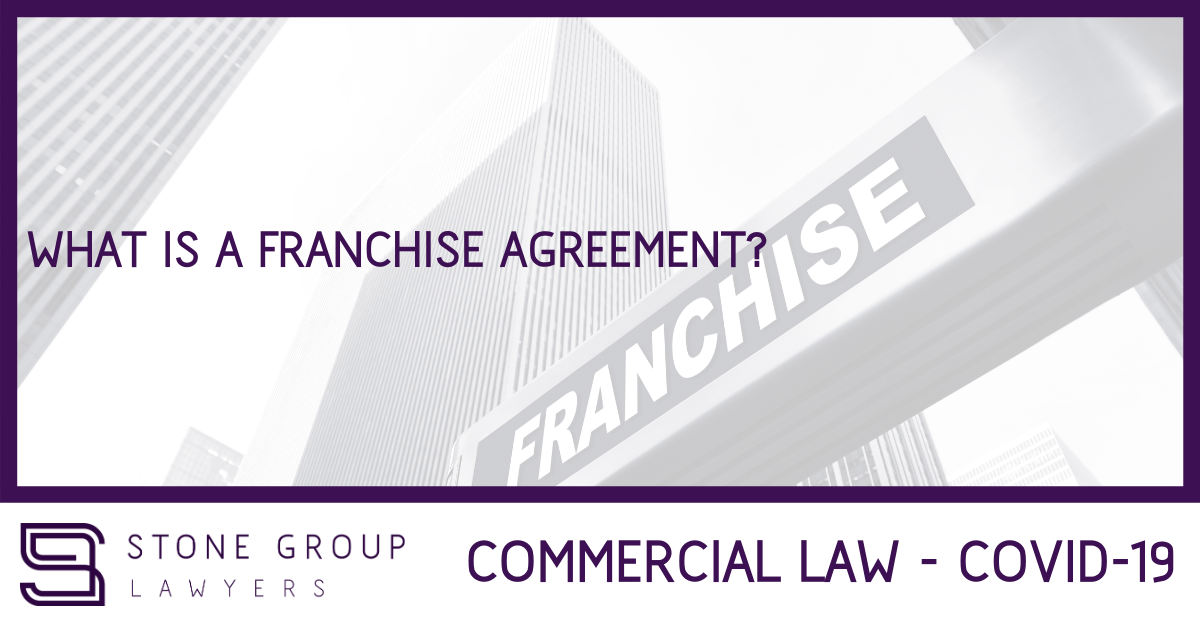
Franchising is not itself a business, but rather, a way of doing business. A franchisor is someone who has achieved a proven system for success through their business model and branding, and has chosen to replicate that system by franchising. A franchisee who is someone who has seen that success and wishes to operate a business under the branding, systems and procedures stipulated by the franchisor. A Franchise Agreement is the contract between these parties which sets out the terms and conditions of their business relationship.
The Australian franchising industry is regulated by the Franchising Code of Conduct (Code). The Code contains the legal definition of a “Franchise Agreement”. There are four elements which must be present for an agreement to be a “Franchise Agreement”:
1. there is an agreement which is written, oral or implied; and
2. one person grants to another person the right to carry on a business offering, supplying or distributing goods or services in Australia under a system or marketing plan substantially determined, controlled or suggested by the franchisor; and
3. under which the operation of the business will be substantially or materially associated with a trade mark, advertising or a commercial symbol owned, used or licensed by the franchisor or specified by the franchisor; and
4. under which, before starting or continuing the business, the franchisee must pay or agree to pay the franchisor a fee. As an example, this fee can include an initial capital investment, payment for goods or services, or a royalty fee, but excludes payments for goods or services supplied on a genuine wholesale basis or repayment of a loan.
It does not matter what the parties call it and what name appears on the agreement; if it meets all four criteria, it will be a Franchise Agreement. As the saying goes, if it looks like a duck, walks like a duck and quacks like a duck, then it probably is a duck. The same reasoning of considering substance over form can be applied to whether a business arrangement constitutes a Franchise Agreement.
The conduct of franchisors and franchisees towards each other is regulated by the Code. The Code can be found on the website of the Australian Competition and Consumer Commission (ACCC). The ACCC actively monitor and enforce compliance with the Code.
The Code regulates many obligations and procedures which must be followed and cannot be waived. Some of these include the following:
1. The franchisor must maintain a Disclosure Document containing information about their franchise system. It must be in the prescribed format and updated annually (with some exceptions) and include details about current and former franchisees, all costs a franchisee can expect to incur during the course of the franchise and certain litigation that the franchisor and its officers have been involved in.
2. A current Disclosure Document must be given to a prospective franchisee along with a copy of the proposed Franchise Agreement and the Code at least fourteen days before the franchisee enters into a Franchise Agreement. This period allows prospective franchisees time to do their own independent investigations into whether the franchise is the right choice for them.
3. Franchisees are granted a seven day cooling-off period after entering into a Franchise Agreement or making a non-refundable payment to the franchisor, except on renewals, variations or transfers of existing businesses. Franchisees who have a last-minute change of mind can take advantage of the cooling-off period, but they will have to compensate the franchisor for some of the franchisor’s reasonable disclosed costs.
4. Before entering into a Franchise Agreement, a franchisee must give the franchisor a statement about whether or not they received independent legal, accounting and business advice. It is not mandatory for a franchisee to obtain this advice, but they do need to tell the franchisor if they obtained it or not.
5. There are rules governing how a franchisor can operate a marketing or advertising fund for the franchise system to which franchisees contribute. Franchisors must be transparent about what expenses they use this fund for and provide franchisees with annual statements if such a fund exists.
6. Franchisors are subject to certain restrictions when requiring franchisees to incur items of significant capital expenditure during the course of the franchise (such as store and equipment upgrades). The expense generally needs to be disclosed in the Disclosure Document, and/or be an expense which will be incurred by a majority of franchisees within the franchise system.
7. If the franchisor will place restrictions on the products and services which are used or sold in a franchisee’s business, including the suppliers a franchisee may use, then clear details of these must be included within the franchisor’s Disclosure Document. This disclosure also extends to any restrictions on the franchisee marketing the products and services of their franchised business online.
8. There are processes to be followed for the resolution of disputes between a franchisee and franchisor, which include transparency between the parties about what the issues are, working together to resolve the dispute, and failing a resolution, attending mediation.
9. Strict rules exist for terminating a Franchise Agreement. If a franchisee breaches a Franchise Agreement and the franchisor wants to rely on that breach to terminate the Franchise Agreement, franchisors must give written notice setting out what needs to be done to fix the breach, together with a reasonable time to do so (not longer than thirty days). It’s only if the breach is not remedied accordingly that a franchisor can then terminate the Franchise Agreement because of that breach. There are limited circumstances where this does not apply and the franchisor can terminate a Franchise Agreement immediately, for example, if the franchisee becomes bankrupt/insolvent, acts fraudulently in connection with the franchised business or endangers public health and safety.
10. There is an overarching obligation for franchisors and franchisees to act in good faith in their dealings with each other. The Code doesn’t define “good faith”, so it’s determined on a case-by-case basis. It will include acting honestly in dealings with one another and not acting arbitrarily, and cooperating to achieve the purpose of the Franchise Agreement. However, this does not restrict either the franchisee or franchisor from acting in their own genuine commercial interests.
The purpose of the Code is to even-out the power imbalance which exists in a franchise relationship. Franchisors generally have the greater share of power in the relationship, so the Code places limits on this power, but at the same time ensures both franchisors and franchisees act fairly.
The Code also endeavours to ensure that a franchisee is made aware that signing up to a franchise is a significant commitment, and that franchisees are provided with the some of the key information needed to assist in making an informed decision as to whether the franchise model is a suitable investment.
The responsibility of enforcing the Code rests with the ACCC. Any breach of the Code is also a breach of the Competition and Consumer Act 2010 (Cth).
Breaches of some provisions will attract penalties. These are currently up to $63,000 in each instance. Multiple breaches of the Code can mean multiple penalties. Breaches can also lead to infringement notices issued by the ACCC. These are currently $10,500 per breach for companies and $2,100 for individuals involved in the conduct (such as a company director).
Given that compliance with the Code is actively monitored and enforced by the ACCC, the Code must therefore be taken seriously by everyone in the franchise relationship.
The team at Stone Group Lawyers are experienced in acting for both franchisors and franchisees in all aspects of franchising law. Give us a call if you need our assistance.
Disclaimer: This article is only meant to give you general information and should not be relied on as legal advice. Speak to one of our lawyers for more information.

Luke is an Associate with Stone Group Lawyers and is a regular contributor to online and print media for Inside Franchise Business. Luke is also a member of the Queensland Law Society Franchise Law Committee.
"*" indicates required fields
Suite 31106, Level 11 Southport Central Commercial Tower 3,
9 Lawson Street, Southport QLD
Riverside Centre
Level 37, 123 Eagle Street
Brisbane City, QLD 4000
Ⓒ 2025 Stone Group Lawyers | Site By Merge

